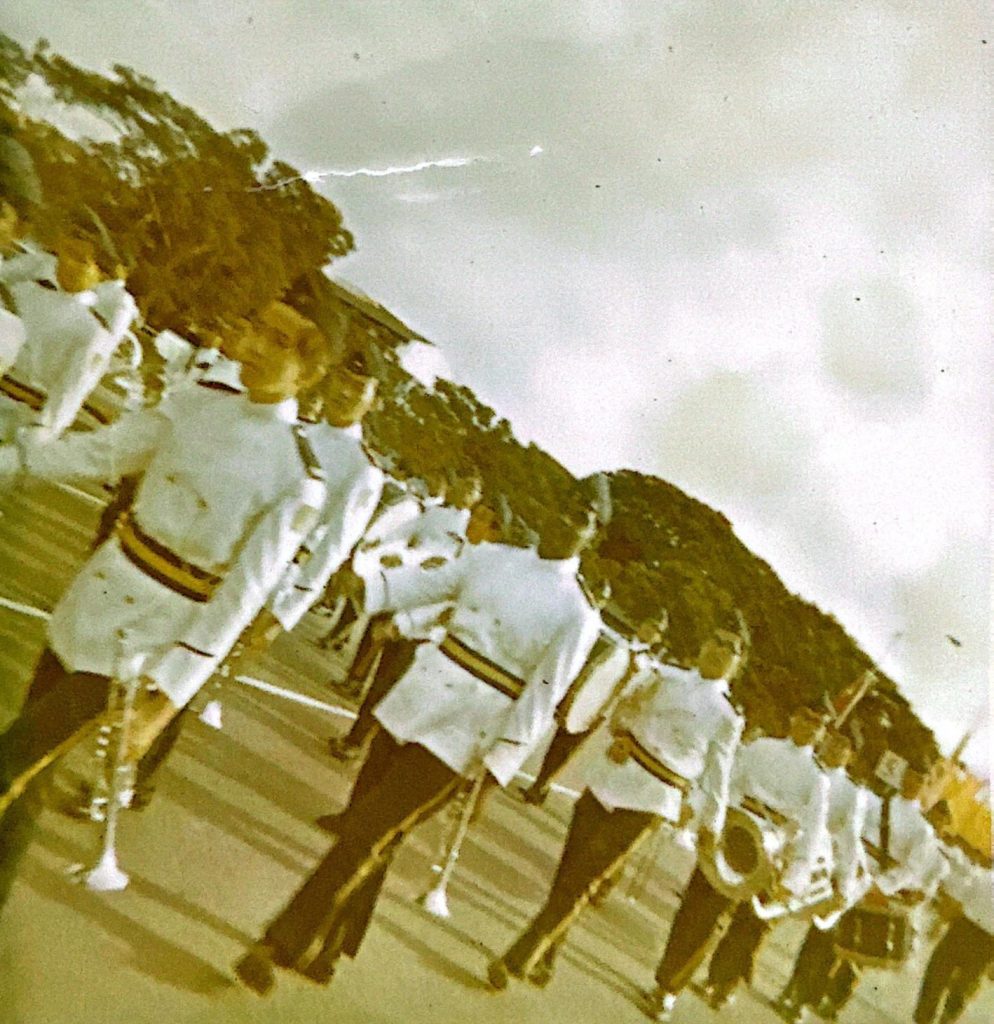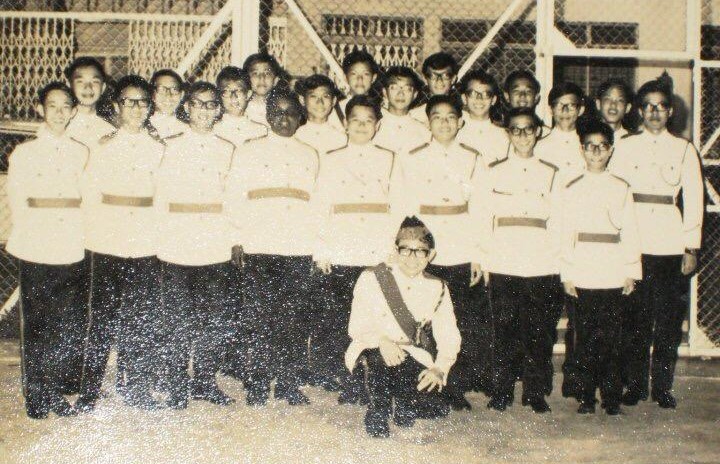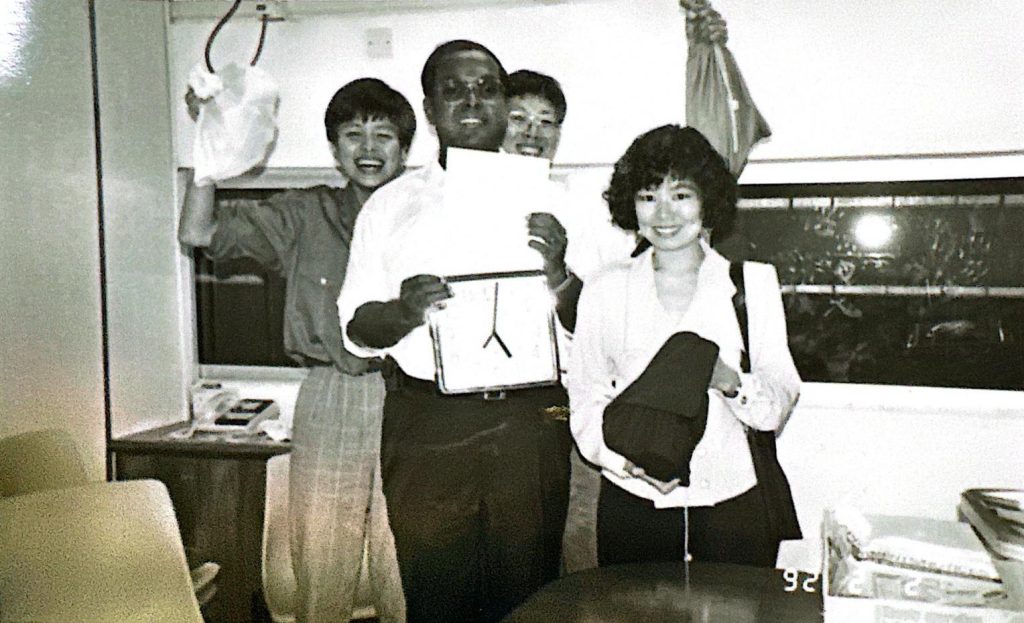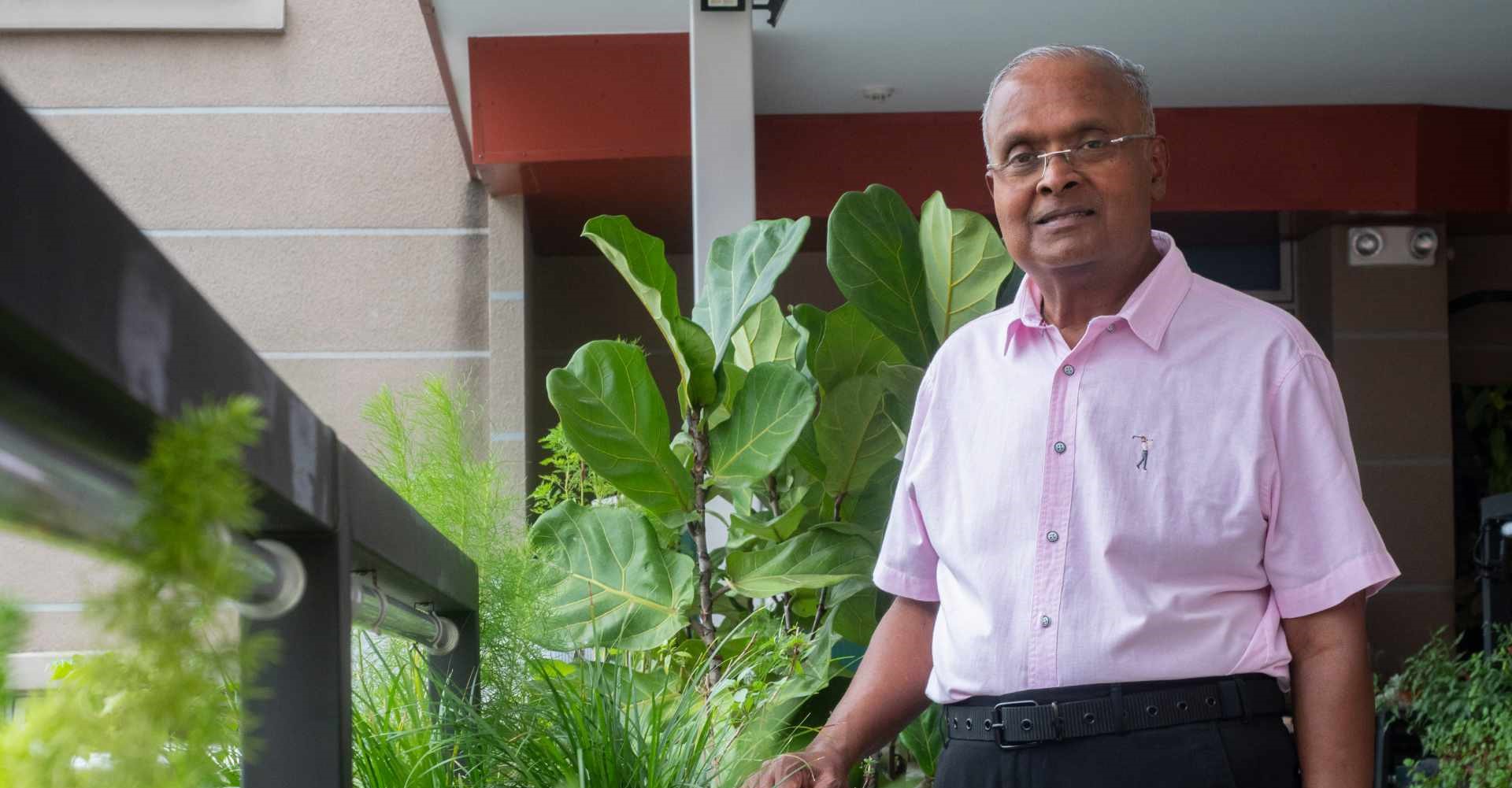Jeyaraj Indra Raj, 71, is one trumpet player who shies away from blowing his own trumpet.
A musician in the Wind Ensemble2 at Wesley Methodist Church (WMC) since 1990, Indra, a lawyer, preferred to volunteer quietly behind the scenes on advisory boards for charitable causes in healthcare and education, amongst others.
However, the spotlight was thrown on him a few years ago. It started when he happened to be seated at the same table as then-Prime Minister Lee Hsien Loong at an appreciation lunch.
In their teens, they both happened to play in the combined schools band5 at Singapore’s first five National Day Parades. They only knew each other by sight.
PM Lee was then a Catholic High student who played the euphonium (a mini tuba), and subsequently the clarinet. Indra, from Anglo-Chinese School (ACS), played the trumpet.

As the two men reminisced about those days, PM Lee heard that Indra, in his late 60s, was still playing the trumpet. He remarked: “Indra Raj is a good example of active ageing.6”
Chief Executive Officer of St Luke’s Hospital, Prof Tan Boon Yeow, in particular, has been encouraging Indra to step out and speak up to inspire others to serve, keep fit and to share God’s love.
Influences and Instruments of Service
Indra, a fifth-generation Christian, was four years old when his mother decided to move the family from the Tamil Methodist Church at Short Street to WMC.
His great-great grandparents came to Christ when they were in Ceylon.
Indra, who was born in Singapore in 1953, said: “I went through the Sunday school system at WMC from kindergarten all the way up to the senior department. When I was in Pre-U, I went for membership class.”
He said the Sinner’s Prayer in Secondary Two when “a very religious classmate insisted that we accept Christ as our Lord and Saviour”.
“There was no sudden transformation. I was still the same. To me, I was a Christian all the time,” said Indra who grew up with a ringside seat witnessing God’s love in action through the “socially conscious Wesleyans, especially the Sunday School teachers, who were well known for what they did”.
Consciously or subconsciously, Indra “imbibed” what they did.
At home, Indra’s mother set the example.
“My mother showed a lot of love to the people around her. She always felt a burden to help those who are disadvantaged. She used to feed the maids around the estate who didn’t have enough to eat,” he said.
In his earliest years at WMC, Indra was aware of Rev Dr Gunnar Teilmann Jr7 starting up Samaritans of Singapore (SOS)8 in the garage of the manse.9
“He developed the place where he parked his car into an office with the 24-hour hotlines. Later on, the government took over SOS and developed it further,” Indra recalled.
Indra also saw how Rev Dr Yap Kim Hao10 advocated for and won independence for the Methodist Church in Singapore and Malaysia11 from the Methodist Mission12 in the USA. Subsequently, the Methodist Churches in Singapore and Malaysia became separate entities. The independence allowed Singaporeans to manage their Churches and chart their future.
Other inspirational Wesleyans included Prof Dr Khoo Oon Teik who helped set up Alcoholics Anonymous in Singapore in the 1950s, the National Kidney Foundation in 1969, and the Drug Dependence Clinic in 1971.
Indra’s own Sunday School teachers — Dr Aw Swee Eng and Dr Eileen Aw — were among Christian doctors and nurses in the 1990s who mooted the formation of a community hospital in Singapore. Through their experience with their own elderly parents, the Aws saw the need for a step-down facility that would prepare discharged hospital patients for convalescence before returning home.
A Burden to Help
At WMC, Rev Dr Kang Ho Soon shared the vision of the church becoming one of several foundation members13 of the planned community hospital — St Luke’s Hospital14.
“At that time, a church being involved in a ministry like St Luke’s was relatively unknown. Rev Kang was very innovative. He felt that Christians shouldn’t be parochial and remain within the church and only help each other. He believed that they should go out into the world to help the community,” Indra said.
“The common belief at that time was that the church’s main focus was to spread the gospel, not build hospitals. Many were concerned that the church would go bankrupt,” he added.
Indra, who was then a member of the Local Church Executive Committee (LCEC), “saw the need, and saw the wisdom in what Rev Kang was proposing”.
So “the lawyer part” of Indra prepared a paper and presented a case for why the church should be involved in raising funds and the setting up of St Luke’s.
As part of his argument, Indra shared how the hospital was named after the writer of the Gospel of Luke and the book of Acts. The patron saint of the medical profession was a doctor concerned for the disadvantaged and the elderly.
Indra believes that God equipped him with “the energy and determination to do the right thing”.
“When the Lord speaks to me through the prompting of the Holy Spirit, I will feel a burden, a need to do something … whether for the church, an organisation or to help someone. There will be an unease in me until I’ve done it.
“When I’ve done it, I feel peace, and it results in something good. This is how I measure if it is a calling of God,” said Indra.
Assurance that he was heeding God’s prompting also came from at least two leaders of the project. One had told him: “Indra, if you feel that prompting, I’m here to tell you I also feel that God somehow chose you, a lawyer, to do the necessary.”
The LCEC voted in favour of supporting the upcoming community hospital.
“It was a narrow win,” said Indra.
With that, WMC became the eighth and final foundation member of St Luke’s Hospital.
Making Sure St Luke’s Succeeds
Indra was chosen to represent the church on the board of St Luke’s Hospital.
Rev Kang told him: “Indra, you are going into the pot of fire. You have to make sure that St Luke’s succeeds.”
Indra replied: “I will do my best with God’s help.”
After much prayer, Indra gave up his other involvement in community service at the grassroots level15 to focus on the work at St Luke’s.
“It was a difficult choice. Serving in grassroots also involves helping others. But it wouldn’t have been possible to serve on St Luke’s and all the other committees and still have time left for family,” he said.
Indra saw God’s hand working in and through the people who gave their time to set up St Luke’s.
“I saw the way things unfolded flawlessly, seamlessly. It wasn’t a coincidence. It was the work of God,” he said.
“For instance, the eight representatives divided up the list of churches in Singapore and fanned out across the island to sell the cause of St Luke’s. We got funds ranging from a few hundred dollars to a few thousand dollars. These little drops made a mighty ocean,” said Indra.
Foundation members and friends raised close to $4 million. The government provided the remaining $8.7 million out of the $12.5 million construction cost — another blessing — and the hospital was included in high-profile fundraisers.
Other blessings included Member of Parliament, S. Dhanabalan, coming on board as a patron to champion the cause of St Luke’s. At that time, Bukit Batok residents objected to the construction of the hospital in their midst, fearing that it would spread disease and devalue their homes.
“Within a year or two, when St Luke’s started getting a name for itself, everyone at church threw their support behind the hospital. Even the naysayers asked to see the rooms. Many of them subsequently became patients of St Luke’s,” said Indra.
Other churches came on board as partners in the ministry.
Even the residents of Bukit Batok came to count themselves blessed to have a facility that cares for their health at their doorstep. Resale prices of their flats also went up.
Ministry of Health officials came to study how the community hospital was run, and St Luke’s Hospital became “a model, a beacon for the community hospitals that were subsequently set up around Singapore”.
The same thing happened with St Luke’s ElderCare, also the brainchild of Dr Eileen Aw who saw the need to set up a daycare facility for seniors.
Said Indra: “Once St Luke’s ElderCare became successful, it also became the model for subsequent eldercare units.”
Indra was on the board that set up St Luke’s ElderCare for 16 years.
Serving Beyond Church Doors
Two years ago, Indra opted for a slower pace of working life by retiring from litigation after 40 years of practicing law, and becoming a consultant to a law firm.
These days, volunteer work — his way of showing God’s love to the community — takes up “99 percent” of his efforts.
He works on 40 pro-bono cases a month at a legal clinic at the State Courts and also mediates at the Singapore Mediation Centre.
“I have the opportunity to help 40 people,” said Indra.
Indra also serves on the advisory committee of Innova Primary School. He looks out, in particular, for what is being done for children and parents from low-income families.
“Look out for the less fortunate. The economically well-off can look after themselves. It is the others who need help,” he said.
Indra was once invited for a chat about taking on an advisory role in a secular organisation.
When he was asked, “What motivates you to serve?”, Indra answered: “My religion. I feel I am doing God’s work through service and nothing else. I believe in doing the right thing in church or any secular organisation.”
He did not think he would get the role, but he did.
“Service to the Lord is not just within the church among Christians. We should also look outside the church at secular organisations where we can do God’s work every day, and benefit them.
“As John Wesley said: ‘The world is my parish’.”
Trumpeting for God
At church, Indra has served as a trumpet player in the Wesley Wind Ensemble since 1990.
He first picked up the instrument in Secondary One when his older brother, a pianist, urged him to join a band that was being formed. Its members would be trained by the Royal Marines Band from the UK. The trainer assigned the instruments to the boys.

However, after graduating from law school and when working life took over, the instrument lay untouched.
“Then in the late 1980s, the pastoral staff in charge of music, Lim Swee Hong, got wind that I once played the trumpet and persuaded me to try it out in a church setting. On the Sunday before Christmas, he accompanied me on the organ to ‘Come Thou Long Expected Jesus’.
“The congregation liked the sound, so we put out the call for musicians in the church bulletin.”
The ensemble made their debut at the 1990 combined Easter service with just six members. From there the band grew.16
“When I joined the wind ensemble, it was to play the instrument and enjoy the fellowship of the group. But to our surprise, many non-Christians joined the group.
“We were even more surprised that a number of them became Christians and enrolled for membership classes — we never asked them to. I believe the Holy Spirit touched them as they listened to the sermons while waiting their turn in church to play,” said Indra, who himself found the sermons of Dr Teilmann, Bishop Yap and Rev Kang “inspiring, solid and full of depth”.
“One of these musicians who became a Christian through the Wind Ensemble, Terence Chua17, eventually went on to theological school after sensing a call to pastoral duty.
“Another musician was an expatriate Asian trombone player who proclaimed that he was a staunch believer of another religion, and would die and be buried as one. But the day before he left Singapore, he asked me for a Bible. He said he was no longer sure if he was a believer of his original religion.”
In a 2015 video series Our Unsung Heroes18, Indra noted the “multiplier effect” as these musicians brought their friends along, and they too became Christians.
“1, 6, 10, 15, 20 … after that we stopped counting how many came to know the Lord!”
Senior members of the ensemble also have the opportunity to sow into the lives of younger members; they include a professor who coached less-privileged students. They did well in their examinations and went on to get a tertiary education.
In the same video, Indra also encouraged others to use their talents and interests to create opportunities to similarly engage with non-believers through what he calls “lifestyle evangelism”.
“God gives us many gifts. We have church members who may be good footballers, good skaters, good tennis players. Through the camaraderie that develops, I am sure, others will get to know the Lord.
“This is the best form of lifestyle evangelism or discipleship. This is why I’ve stayed on all these years,” said Indra, whose playing has since been affected by essential tremors, a hereditary neurological condition that causes his left hand to shake.
He shares: “At home, I can play Purcell’s Trumpet Voluntary, but in a group setting, I have stopped playing the last posts at funerals or playing solo so as not to risk spoiling the enjoyment of the audience.”
However, spurred on by his bandmates, he continues to serve God musically in a group setting at church.
“I’m not playing for music critics. I am worshipping God and playing for God and His worshippers. I feel gratified when members of the congregation tell me that they felt the Holy Spirit when they heard the instruments play,” said Indra, who shares that pastors pray before the service for God’s anointing on the wind ensemble, choir, ushers and everyone involved.
The group also keeps him feeling young.
“If you are a senior, don’t just mix with your peers. Hang around younger people as well. Join an intergenerational group like the wind ensemble. You cross-learn from each other, and you feel young. When you think young, you feel young. When you think you are old, you feel old.”
Ageing Actively
Indra’s exercise routine no doubt keeps his lungs strong to play the trumpet — “the instrument that will herald Christ’s return”. It also keeps him physically and emotionally fit to serve God through the various ministries he is involved in — “to do all the good he can, for as long as he can”, to borrow a line from John Wesley.
His habit of swimming 30 laps — almost a mile — five mornings a week “has become an addiction”.
“I need to swim,” he says.
“You are never too old to start exercising,” he tells people. Indra himself learnt to swim “in the baby pool” at the age of 39 when he suffered from asthma under the stress of work.
“I couldn’t sleep at night as I had to sit up to breathe. Swimming was recommended to help my condition. Thanks to my wife who said, ‘Look, you must take care of your health’, we both learnt how to swim. We kept on swimming, swimming, swimming — and more than three decades later, we are in the pool by 5.30am. We still wake up at 4.20am when the alarm goes off.”
When Indra was still practicing law, he would be in the office by 8.30am. These days, he and Mary may go on the occasional 9 km-long walk after their swim.
His habit of swimming was featured in The Straits Times in a story, “Exercise as Medicine” in July 2024. A photo of Indra, raising an arm triumphantly from a swimming pool, was splashed across half the cover of the Life! section.
“They were interested in how swimming 30 laps a day has made my health better, despite all the chronic illnesses I live with,” he said.
“Baring the top part of my body for the photo shoot is the bravest thing I’ve done,” the deeply private Indra mused.
“I look uncomfortable in the photos. But I did it to show somebody my vintage that ‘You are what you are. Be proud of it’. There’s nothing to be shy about the body that God has given me.”
Indra has also reaped the benefits of cleaner eating habits which he started a few years ago.
“I used to see the doctor once every three months. Now I see him once a year or once in six months. As of the end of June 2024, my diabetic medicine has been reduced by half. In time, I want to wean myself off it,” he said.

As he follows the black line up and down the pool for 1.5 hours each morning, Indra meditates on God’s Word, hymns, and says his silent prayers. While swimming, he has also come up with solutions to issues he faces.
“There is no one disturbing you. You’re just swimming and your mind is functioning. Recently, I heard Anne Murray singing ‘In the Garden’, and for the next few days the hymn played over and over again in my head as I swam. It enhances the experience of swimming.
“Many friends — mainly Christians — have asked me: ‘How come you look so cheerful when I feel so miserable, depressed and weighed down?’”
His reply? “Exercise.
“After trying it, they tell me that they feel good, and update me on how many laps they are now swimming.”
Before he started exercising, he dreaded going to work.
“There was so much to be done…deadlines. At night, I would wake up worried whether I have a certain document, and worry about what is going to happen with the cases,” he admitted.
“All that went away when I started swimming. I think the endorphins keep your mind clear.”
Indra is also clear on another thing. And that is to “trust in the Lord with all your heart, and lean not on your own understanding; in all your ways acknowledge Him, and He shall direct your paths.” (Proverbs 3:5–6, NKJV)
“That is my philosophy in life,” said Indra.
He added: “And believe in Him. Hear His promptings to do the right thing. They are there. It is whether or not you want to hear them. It may be expensive for you, or require a sacrifice from you. But if you follow that prompting, some good will result to someone, or some organisation.”

